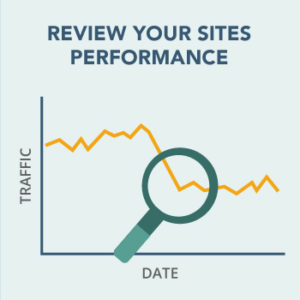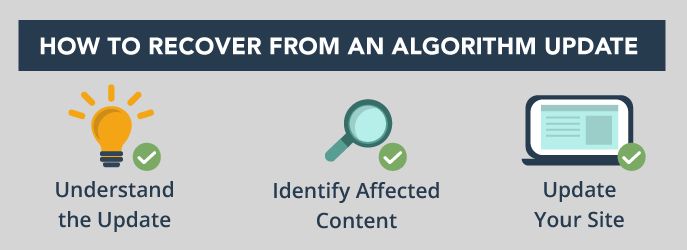Google and other search engines continually release updates to improve a user’s search experience online. And while these algorithm updates have long-term benefits, they may come with short-term negative effects that impact your website and marketing key performance indicators (KPIs).
How to Tell If a Search Engine Update Affected Your Website
When a new core update is being rolled out, you may begin to notice changes in your website metrics, like organic traffic, keyword rankings, clicks, and impressions. These fluctuations are early signs that an update may be affecting your website and it’s time to start paying attention.
Look at Site Performance
Dramatic changes in one or more organic KPIs is a good indicator that your site has been affected by an update, but you shouldn’t isolate any one KPI and jump to a conclusion too early.
For example, we had a client that was seeing a drop in organic traffic to their site. When we took a look at keywords and impressions, we saw they were starting to rank for long-tail keywords that were primarily on the second and third pages of results—pages where 0.63% of searchers click on something. 
Many times you’ll see a combination of changes with different website KPIs, depending on the update. It’s important to take a look at all the tools in your toolbelt (Analytics, Search Console, keyword tools, etc.) to get the full picture of what is affecting your website.
If you do notice dramatic changes in KPIs, what is your next step?
Give It Time
Google has gotten much better at rolling out search updates since the first core update in 2003 that affected many innocent sites as “false positives.” Nowadays, if you give your website time—around two weeks—after an update is released, you may see that your stats begin to bounce back without you having to do anything.
If two weeks pass and you still notice minimal improvements to the affected KPIs, it’s time to start planning how you will update your website to recover from an algorithm update.
How to Recover From an Algorithm Update
The first step to recovering from a search engine update is to know that the update is completely rolled out. Google is constantly testing and updating its platform. In 2020, Google made 4,500 changes to search and performed 600,000 tests alone. Many of these tests are part of algorithm development and can cause changes to your KPIs.
You want to make sure that an update is finished before you make changes to your website so you don’t accidentally cause more harm than good—as mentioned, giving your site time could be all you need to do. Blogs like Google’s own Search Central and Search Engine Land’s Algorithm Updates are good resources for staying in the know about updates.
Understand the Update
Once you know a core update is fully rolled out, read up on it and understand the purpose of the update and the types of websites, businesses, content, and digital marketing practices that it affects. Knowing this will help you prioritize content and identify where you need to make changes in your digital marketing strategy. For our client above, we revisited our keyword and content strategy to focus on the short-tail variations of the specific long-tail keywords we began to rank for on the later pages of SERPs.
Identify Affected Content
Sometimes an algorithm update will only affect portions of your website, like old and outdated content or product pages. Other times it may affect your whole site. Use Analytics, Search Console, and keyword tools to identify what areas of your site are most affected. Filtering data by the date the update was released can help you identify these pages more easily.
Update Your Site
The final step is to update the content of your site. Prioritize relevant and valuable pages first such as key landing pages, top-performing blogs, and pages that are most visited on your site. Once you’ve made updates, it’s a good idea to ask Google to re-crawl your website. This will improve the chances that your site is re-crawled and indexed sooner rather than later. After that, take a look at how you can create new content or try different marketing strategies to continue to grow your brand.
Stay Ahead of Search Engine Updates
Partnering with a digital marketing agency like Mad Fish that creates SEO and content strategies with algorithm updates in mind is a great way to stay on top of core updates and make strategic changes to your content marketing.
Want to chat? Contact us with questions about our content and other digital marketing services. We’re ready when you are!
Learn more about this article’s author, Content Strategist, Marcus Yoo.


